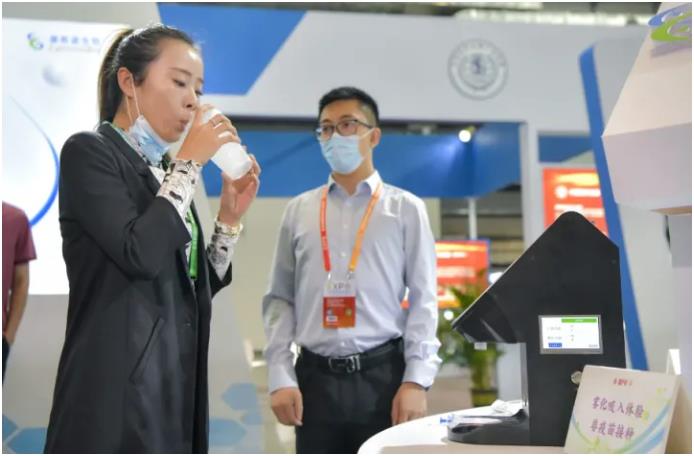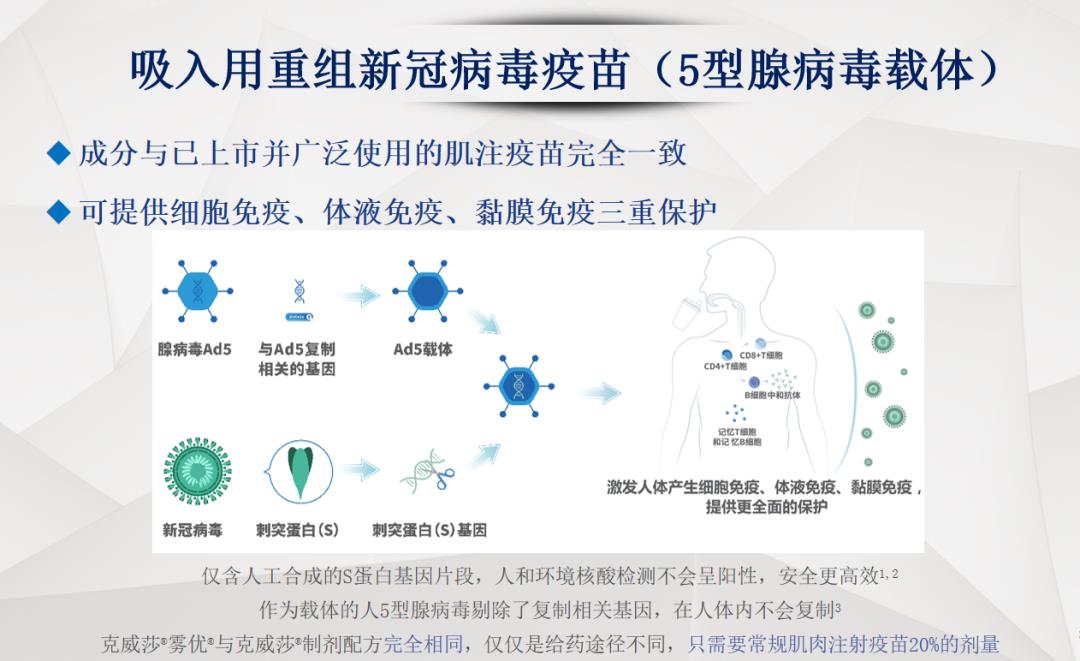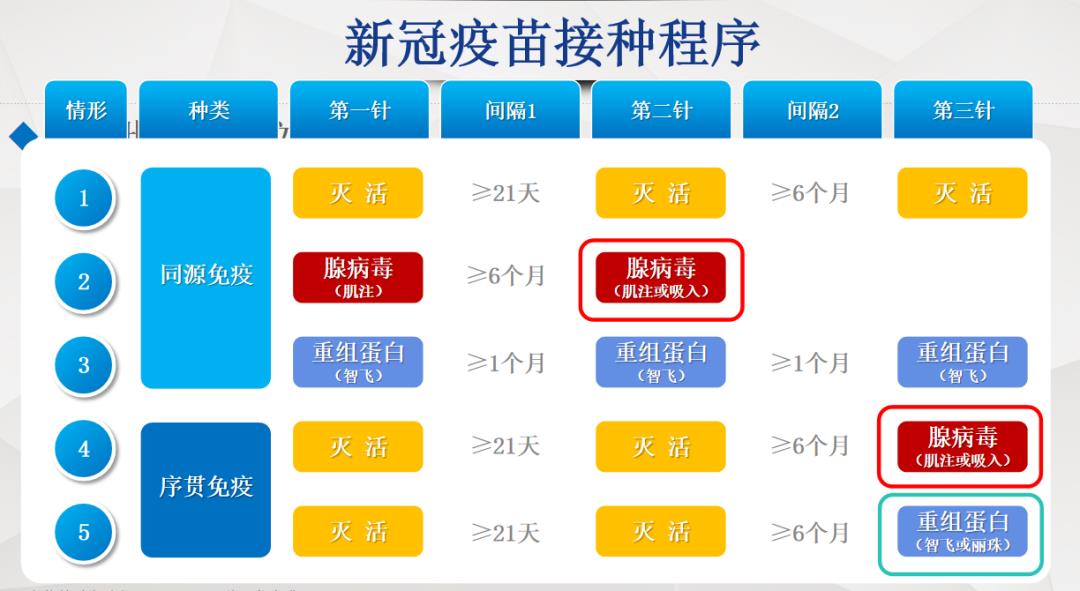Inhaled COVID-19 Vaccine Start Inoculation! Do those who have finished booster shots need to be vaccinated? (Attached with 18 questions about COVID-19 vaccine for inhalation)
guide reading
On September 4th, the newly-developed recombinant novel coronavirus vaccine for inhalation (adenovirus type 5 vector) was put forward by the National Health and Wellness Commission, and was approved by National Medical Products Administration to be used as booster for emergency use, making it the first inhaled COVID-19 vaccine in the world.
On October 25th, Shanghai started the registration of intensified immunization with recombinant Covid-19 vaccine for inhalation (adenovirus type 5). On 26th, the immunization with recombinant Covid-19 vaccine (adenovirus type 5) for inhalation was started.

What is recombinant Covid-19 vaccine for inhalation? This non-injected, non-cold chain COVID-19 vaccine was called "revolutionary ideal" by Academician Chen Wei. What’s good about this "ideal" vaccine?

Chen Wei, researcher of Academy of Military Sciences, vice chairman of China Association for Science and Technology and academician of China Academy of Engineering.
↓↓↓
Studies at home and abroad have proved that enhanced immunization with Covid-19 vaccine can enhance the protection effectiveness and prolong the protection period.
The so-called atomization inhalation immunity means that the vaccine is atomized into tiny particles by an atomizer, and then enters the respiratory tract and lungs by breathing inhalation, thus stimulating mucosal immunity, which cannot be brought by intramuscular injection. Generally, intramuscular injection of COVID-19 vaccine can only induce humoral immunity and cellular immunity. In addition, immunization with atomized inhalation is painless and has higher accessibility.
Immune response and specific antibodies induced by intramuscular injection are easier to enter the blood circulation system, but their contents in nasal cavity and lungs are not high enough to achieve immune effect quickly when the virus invades. It takes a certain reaction time for these antibodies to reach the respiratory tract from the blood, but the virus invades our body and usually seizes this time difference, so many people are infected during this time.
However, this non-injected vaccine is inhaled, and only one-fifth of the dose of the vaccine is injected each time. It can also induce mucosal immunity through atomized inhalation to achieve the best effect of triple immunity, which can not only block the infection of Covid-19, but also inhibit the spread of the virus.
According to the relevant requirements of the state, citizens only need one dose of hypohomologous booster immunization or sequential booster immunization at present. When people aged 70 and over are vaccinated, they should be accompanied by family members or volunteers.
COVID-19 vaccine for inhalation 18 questions
1. What is recombinant Covid-19 vaccine for inhalation?
Answer: The recombinant Covid-19 vaccine for inhalation (adenovirus vector type 5) uses an adenovirus vector harmless to human body to deliver the genetic material expressing S protein into human body, and uses an atomizer to atomize the vaccine into tiny particles, which can reach the lung tissue through oral breathing by inhalation, thus stimulating triple immunity of mucosa, body fluid and cells.

2. What are the conditions for inoculation of recombinant Covid-19 vaccine for inhalation?
A: At this stage, the inactivated vaccine produced by Sinopharm China Biotechnology Co., Ltd., Beijing Institute of Biological Products Co., Ltd., Sinopharm China Biotechnology Co., Ltd., Wuhan Institute of Biological Products Co., Ltd. and Beijing Kexing Zhongwei Biotechnology Co., Ltd. and the intramuscular recombinant COVID-19 vaccine (adenovirus type 5) produced by Kangxinuo Biological Co., Ltd. can be used to carry out one dose of booster immunization for people aged 18 and above for six months. Recombinant Covid-19 vaccine for inhalation (adenovirus type 5 vector) is not used for basic immunization for the time being.

All kinds of people only need to be vaccinated with one dose of hypohomologous booster immunization or sequential booster immunization.
3. What is the dose of recombinant Covid-19 vaccine for inhalation?
A: The dosage is 0.1mL each time.
4. Can people over 60 be vaccinated? Can people under 18 be vaccinated with recombinant Covid-19 vaccine for inhalation?
A: At present, the recommended vaccination population for inhalation dosage forms is people aged 18 and above.
5. How effective is the booster immunization of recombinant Covid-19 vaccine for inhalation?
A: At present, the clinical study of sequential booster immunization with recombinant Covid-19 vaccine for inhalation and inactivated novel coronavirus vaccine in healthy adults aged 18 and above in China shows that sequential booster immunization with recombinant Covid-19 vaccine for inhalation and inactivated vaccine can significantly enhance the immune response.
6. What is the immune persistence of recombinant Covid-19 vaccine for inhalation?
A: Immunization persistence research shows that after 6 months of heterologous inoculation with recombinant Covid-19 vaccine for inhalation, the neutralizing antibody remains at a high level.
7. What is the safety of recombinant Covid-19 vaccine for inhalation?
A: A safety study conducted among tens of thousands of people showed that the recombinant Covid-19 vaccine for inhalation was safe for people over 18 years old, and no serious adverse reactions were found.
8. What are the vaccination contraindications of recombinant Covid-19 vaccine for inhalation?
Answer: (1) Those who are allergic to the active ingredients, any inactive ingredients and substances used in the production process, or those who have been allergic to similar vaccines before.
(2) Those who have had severe allergic reactions to vaccines in the past (such as acute allergic reactions, angioneurotic edema, dyspnea, etc.).
(3) Patients with uncontrolled epilepsy and other progressive nervous system diseases have a history of Guillain-Barre syndrome.
(4) People who are suffering from fever, or acute diseases, or acute attacks of chronic diseases, or patients with uncontrolled serious chronic diseases;
(5) Pregnant women.
9. Can patients with chronic diseases be vaccinated with recombinant Covid-19 vaccine for inhalation?
A: According to the Technical Guidelines for Vaccination in Covid-19 (First Edition), people with chronic diseases are at high risk of severe illness and death after being infected with Covid-19. People with chronic diseases with stable health and good drug control are recommended to be vaccinated. Vaccination is suspended when chronic diseases are in acute attack. Have a history of convulsion, epilepsy, encephalopathy or mental illness or family history; Have a history of asthma, chronic obstructive pulmonary disease, pulmonary fibrosis and other basic diseases or abnormal lung function; Use with caution in patients with impaired immune function (such as malignant tumor, nephrotic syndrome and other immunodeficiency diseases).
10. Do people cured in COVID-19 need to be vaccinated with recombinant Covid-19 vaccine for inhalation?
A: According to the Technical Guidelines for Vaccination in Covid-19 (First Edition), it is rare for Covid-19 to be reinfected within 6 months after infection. In the past, COVID-19 virus infected people (patients or asymptomatic infected people) can be vaccinated with one dose after 6 months on the basis of full notification.
11. Can people with allergies be vaccinated with recombinant Covid-19 vaccine for inhalation?
A: In the Technical Guide for Vaccination in Covid-19 (First Edition), it is clear that those who have had severe allergic reactions to vaccines in the past (such as acute allergic reactions, angioneurotic edema, dyspnea, etc.) are contraindications for vaccination of Covid-19 vaccines; In addition, the severity of allergies and allergens should be considered and implemented according to the doctor’s advice.
12. How to inoculate recombinant Covid-19 vaccine for inhalation?
A: Please practice several times before inhaling, and then start the formal vaccination.
Step 1: Take a deep breath first (do not exhale into the atomizing cup);
Step 2: hold the nozzle of the atomizing cup in your mouth, and inhale deeply until there is no fog in the cup;
Step 3: Hold your breath for more than 5 seconds (at least 5 seconds), then breathe normally, and the inoculation is over.
13. Under what circumstances should we re-inhale recombinant Covid-19 vaccine for inhalation on the spot?
Answer: (1) There is obvious misty gas in the atomizing cup after inhalation;
(2) Cough and early exhalation occur during inhalation (including 5-second breath-holding period).
Suction failure needs to inhale a dose of vaccine again, and only one repeated inhalation is allowed.
14. What should I pay attention to after vaccination with recombinant Covid-19 vaccine for inhalation?
A: You should stay on the spot for at least 30 minutes after inoculation. Avoid contact with previously known allergens and common allergens within one week after inoculation, and try not to drink alcohol, eat spicy food or seafood. It is recommended to have a light diet and drink plenty of water.
15. What adverse reactions may occur after vaccination with recombinant Covid-19 vaccine for inhalation?
A: Common systemic adverse reactions include symptoms such as fatigue, headache, fever, dry mouth and swollen throat. Generally, they can recover by themselves without special treatment.
16. Will the inoculation of recombinant Covid-19 vaccine for inhalation affect the results of nucleic acid test and antigen test?
Answer: The characteristic of adenovirus vector COVID-19 vaccine is that it only contains the gene sequence of S protein and expresses antigen in human cells, and it does not contain the open reading frame 1ab(ORF1ab) and nucleocapsid protein (N protein) at the nucleic acid detection site, so the vaccination of this vaccine will not cause COVID-19 to be positive for nucleic acid detection.
17. Can I be vaccinated during pregnancy?
A: If you are pregnant after vaccination or have been vaccinated in the case of unknown pregnancy, based on the understanding of the safety of the above vaccines, it is not recommended to take special medical measures (such as termination of pregnancy) just because you have been vaccinated with Covid-19 vaccine. It is recommended to do a good job in pregnancy examination and follow-up. For women who have a pregnancy plan, it is not necessary to delay the pregnancy plan just because of Covid-19 vaccination.
18. After three injections, do I need to get another vaccine for inhalation?
A: According to the guidelines on vaccination work, those who have already completed the booster immunization will not be given further booster immunization at this stage.
Source: The Paper, Shanghai Publishing, Jinshan CDC, Science and Technology Daily.